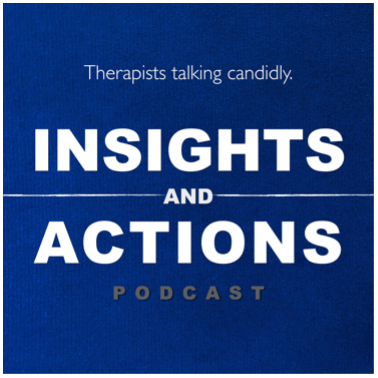Cyndi Turner's Blog, page 2
January 9, 2025
Is College Worth it? Students, Parents, and Mental Health
The latest episode of the Insights & Actions podcast is out now! In this episode, Craig James, LCSW, LSATP, MAC, Matt Christian, LCSW, and Johnny Pierce, PsyD pose the question “Is college worth it?” They talk about ‘the college obsession’, how parents’ best intentions can go wrong, mental health, and stoic practices for wellbeing.
Also, in this episode
Statistics on the financial return on investment for going to collegeHow do you define success (for your kid)?Kids not being allowed to failInput from a school counselor…and much more!
Have you ever wanted to hear what therapists really talk about when they’re out of session? The Insights & Actions podcast allows you to do just that. Insights & Actions are candid conversations with Insight Into Action Therapy and Insight Recovery Centers’ clinical team.
Insights & Actions can be found on YouTube, Spotify, Apple podcasts, Amazon music, and Audible.





If you would like a free consultation with a therapist at Insight Into Action Therapy, please contact us!

The post Is College Worth it? Students, Parents, and Mental Health appeared first on Insight Into Action Therapy.
“Psychology “Buzzwords” – Mindfulness, Neurodiversity, and Safety”
The latest episode of the Insights & Actions podcast is now available! In this episode, Craig James, LCSW, LSATP, MAC, Matt Christian, LCSW, and Johnny Pierce, PsyD, explore popular buzzwords in psychology—safety, neurodiversity, and mindfulness. Where did these terms originate? How are they used today? And what impact do they have on their field and culture?
This episode covers:
The roots of mindfulness in Buddhism and its role in modern psychologyHow the pursuit of safety can fuel anxietyDifferent takes on the concept of neurodiversityPersonal stories and insights…and much more!
Have you ever wanted to hear what therapists really talk about when they’re out of session? The Insights & Actions podcast allows you to do just that. Insights & Actions are candid conversations with Insight Into Action Therapy and Insight Recovery Centers’ clinical team.
Insights & Actions can be found on YouTube, Spotify, Apple podcasts, Amazon music, and Audible. Click the icons below to watch and listen!





If you would like a free consultation with a therapist at Insight Into Action Therapy, please contact us!

The post “Psychology “Buzzwords” – Mindfulness, Neurodiversity, and Safety” appeared first on Insight Into Action Therapy.
January 1, 2025
Signs You May Need Dual Diagnosis Treatment
Living with emotional challenges and substance use concerns can feel overwhelming. Often, these issues are interconnected, and addressing one without the other may not lead to lasting improvement.
For individuals in Northern Virginia, dual diagnosis treatment in Ashburn, VA, offers a comprehensive solution to these complex struggles. If you’re unsure whether this type of care is right for you, understanding the signs can help you take the next step toward recovery and wellness.
What Is Dual Diagnosis?Dual diagnosis refers to the co-occurrence of emotional challenges and substance use. This interplay can create a cycle where one issue exacerbates the other, making it difficult to manage either without specialized care. Insight Into Action Therapy provides tailored care to address both aspects simultaneously, offering an integrated approach that promotes lasting healing.
Symptoms of Dual DiagnosisUnderstanding the symptoms of dual diagnosis can help you identify whether you or a loved one may benefit from treatment. These symptoms often include:
Frequent or severe mood swings Anxiety or panic attacks Persistent sadness or emotional numbness Increased reliance on alcohol or drugs Strained relationships with family or friends Difficulty focusing or completing tasks Withdrawal symptoms when not using substancesIf you notice these symptoms alongside substance use, seeking dual diagnosis treatment can be an essential step toward recovery.
Recognizing the Signs You Need Dual Diagnosis TreatmentDual diagnosis can present in various ways, depending on the individual. However, some common indicators may signal it’s time to seek professional support:
Difficulty managing emotions – Frequent mood swings, persistent sadness, or feelings of hopelessness may point to underlying challenges that need attention. When these emotions are coupled with substance use, it’s essential to address both issues together to achieve meaningful progress. Using substances to cope – If you rely on alcohol, drugs, or other substances to handle stress, sadness, or anxiety, this could indicate a deeper issue. Self-medicating can mask symptoms temporarily, but it often worsens the underlying concerns. Challenges in daily life – Struggling to keep up with work, school, or home responsibilities can signify a dual diagnosis. These difficulties might arise from the combined impact of emotional struggles and substance use, making it hard to maintain stability. Experiencing physical and emotional symptoms – Symptoms can include fatigue, sleep disturbances, changes in appetite, or feelings of guilt or shame. Substance use may also lead to withdrawal symptoms or health problems, adding another layer of complexity.Repeated attempts to reduce or stop using substances without success may indicate the need for a comprehensive approach that includes mental health and substance abuse treatment in Ashburn, VA.
The Importance of Integrated CareDual diagnosis treatment focuses on addressing both emotional health and substance use simultaneously. This integrated approach ensures that neither issue is overlooked, as they are often deeply intertwined.
At Insight Into Action Therapy, we specialize in dual diagnosis treatment and provide individualized care through evidence-based therapies such as:
Motivational interviewing – Helps clients explore and resolve ambivalence about change Acceptance and commitment therapy (ACT) – Encourages individuals to embrace their feelings while committing to positive actions Trauma therapy – Addresses underlying trauma contributing to emotional struggles and substance useOur programs are designed to empower individuals, helping them uncover the root causes of their struggles and develop healthy coping mechanisms for long-term success.
Contact Insight Into Action Therapy TodayDon’t let dual diagnosis hold you back from the life you deserve. Contact Insight Into Action Therapy in Ashburn, VA, to learn more about our programs and how we can help. Together, we can create a path toward recovery and resilience.
Call 703.935.8544 or complete our online form today to take the first step.
The post Signs You May Need Dual Diagnosis Treatment appeared first on Insight Into Action Therapy.
December 20, 2024
The Role of Therapy in Overcoming Process Addictions
Process addictions, also known as behavioral addictions, are compulsive behaviors that involve excessive engagement in activities despite negative consequences. Unlike substance addictions, which involve physical dependencies on drugs or alcohol, process addictions are centered on actions that provide a sense of pleasure or relief.
Recognizing a process addiction can be challenging, as the behavior itself may seem harmless or even socially acceptable. However, when these activities disrupt daily routines, relationships, or well-being, they can become harmful and warrant professional support.
Types of Therapy for Process AddictionsEffective therapy for process addictions incorporates various evidence-based approaches that are tailored to meet individual needs. Each therapeutic method offers unique benefits, helping individuals build resilience and self-awareness in their recovery journey. Here are some key types of therapy commonly used in treating process addictions:
Cognitive-behavioral therapy (CBT) – CBT focuses on identifying and changing the negative thought patterns that drive compulsive behaviors. By recognizing these patterns, individuals can learn to reframe their thoughts and develop healthier responses to triggers. CBT is particularly effective for individuals with gambling addiction and other process addictions, as it helps break the cycle of behavior by addressing the cognitive distortions that reinforce it.Acceptance and commitment therapy (ACT) – ACT helps individuals manage process addictions by focusing on acceptance rather than avoidance of difficult emotions. This approach encourages individuals to embrace their thoughts and feelings without judgment, allowing them to detach from harmful behavioral patterns. ACT helps individuals align their behaviors with their values, fostering a sense of purpose and motivation to overcome their addiction.Motivational interviewing (MI) – MI is a person-centered approach that helps individuals find their intrinsic motivation for change. In process addiction therapy, MI can be particularly beneficial, as it empowers clients to explore their reasons for seeking recovery and build confidence in their ability to change. By fostering a supportive and nonjudgmental environment, MI allows individuals to express their concerns, clarify their goals, and strengthen their commitment to change.In addition, family therapy is often a valuable component of process addiction treatment, as process addictions can strain relationships and create tension within families. Family therapy sessions provide an opportunity for open communication, helping family members understand the nature of process addiction and develop strategies to support their loved one’s recovery. This form of therapy also addresses any family dynamics that may contribute to the addiction, fostering a supportive environment that enhances the recovery process.
Types of Process AddictionsProcess addictions encompass a wide range of compulsive behaviors. While some may be more widely recognized, all process addictions can have a significant impact on a person’s life. Here are some common types of process addictions:
Gambling addiction – Gambling addiction involves compulsive gambling behaviors that disrupt personal and financial stability. Those with gambling addiction may continue betting despite the risk of significant losses, impacting their well-being and relationships.Shopping addiction – Shopping addiction, also known as compulsive buying, involves excessive spending on items that may not be needed. This addiction can lead to financial difficulties and a reliance on material possessions for emotional satisfaction.Internet and gaming addiction – Gaming and internet addiction are increasingly prevalent in a digital age, as people spend excessive time on social media, gaming, or browsing. These addictions can lead to social isolation and a decline in physical health.Exercise addiction – While exercise is generally positive, exercise addiction involves an obsessive need to work out, often at the expense of physical and social health.Each of these process addictions has its unique challenges and requires a tailored therapeutic approach. By addressing the specific behaviors and underlying motivations, therapy for process addictions can help individuals regain control over their lives.
Contact Insight Into Action TherapyIf you or a loved one is struggling with a process addiction, contact Insight Into Action Therapy to learn more about our specialized process addiction therapy. Reach out today at 703.935.8544 or online to discover how Insight Into Action Therapy can help you achieve lasting change.
The post The Role of Therapy in Overcoming Process Addictions appeared first on Insight Into Action Therapy.
December 6, 2024
Understanding Teen Addiction: Signs and Symptoms
Adolescence is a time of growth, discovery, and, sometimes, challenges. For some teens, it may be marked by struggles with addiction, a complex issue that affects their well-being and relationships. Recognizing the signs of addiction in teens is crucial, as early intervention can make a significant difference in their journey toward recovery. Behavior health programs for teens can forge pathways toward a healthier, happier life in recovery.
Common Signs of Addiction in TeensIdentifying the signs of addiction in teens can help families and caregivers take action before the issue escalates. Here are several key signs to look out for:
Behavioral ChangesTeens dealing with addiction often exhibit noticeable shifts in their behavior. They may become more secretive, spend time with new friends, or distance themselves from family members. Increased aggression, irritability, or a lack of interest in previously enjoyed activities are common indicators of substance use.
Physical SymptomsPhysical signs can vary based on the substance involved, but there are some universal symptoms. Changes in appearance, such as weight fluctuations, poor hygiene, bloodshot eyes, or dilated pupils, may signal a substance use issue. Teens might also have unexplained injuries or experience frequent illnesses.
Emotional ShiftsTeens struggling with addiction often experience heightened emotional responses. These can include extreme mood swings, anxiety, depression, or sudden anger. Many teens facing substance use issues may also express a sense of hopelessness, isolation, or despair. This emotional volatility may be related to the effects of substances on their developing brains.
Academic and Social DeclineAddiction can quickly take a toll on a teen’s social life and academic performance. Teens facing addiction may skip classes, receive failing grades, or face disciplinary actions. Socially, they may distance themselves from family and long-term friends, choosing instead to associate with peers who support or engage in similar behavior.
Why Teens Are Vulnerable to AddictionUnderstanding why teens are particularly vulnerable to addiction can shed light on effective prevention and treatment strategies. Several factors contribute to their susceptibility:
Peer pressure – Teens may experiment with substances to fit in with friends, seek approval, or avoid rejection. Peer influence is powerful during adolescence, often overshadowing the guidance of parents or other authority figures.Stress and emotional challenges – Adolescents face unique stressors, including academic pressures, social anxiety, and evolving self-identity. Some may turn to substances to cope with feelings of stress, sadness, or anger.Lack of experience and impulse control – The adolescent brain is still developing, particularly in areas responsible for decision-making and impulse control. This makes teens more likely to take risks, including trying substances, without fully considering the consequences.Finding the right support for teen addiction is essential to their recovery journey.
Effective Treatment Approaches for Teen AddictionAt Insight Into Action Therapy, treatment for teen addiction is built on evidence-based approaches and compassionate care. Programs include various therapies and support services that guide teens toward recovery. Here are some of the effective approaches used:
Motivational interviewing – This technique helps teens explore their motivations and encourages them to make positive behavioral changes at their own pace.Dual diagnosis – Dual diagnosis treatment addresses both substance use and underlying emotional challenges, providing a more holistic approach to recovery.Family therapy – Family therapy sessions help improve communication, rebuild trust, and foster a supportive environment that strengthens the recovery process.To ensure lasting success, aftercare programs equip teens with the skills they need to maintain sobriety in real-world situations. Insight Into Action Therapy provides ongoing support, including relapse prevention techniques and resources for continued growth.
Contact Insight Into Action Therapy TodayIf you recognize the signs of addiction in your teen, consider reaching out to Insight Into Action Therapy. Contact us today at 703.935.8544 or online to learn more about how we can help your family navigate this journey together.
The post Understanding Teen Addiction: Signs and Symptoms appeared first on Insight Into Action Therapy.
November 22, 2024
Psychiatry vs. Psychology: What’s the Difference?
When it comes to mental health support, understanding the differences between psychiatry and psychology can help individuals make informed decisions about their treatment options. At Insight Into Action Therapy, we offer a range of mental health services, including psychiatric services and therapy, tailored to meet the diverse needs of our clients.
While both psychiatrists and psychologists play essential roles in mental health care, their approaches, training, and methods can differ significantly. This article explores the distinctions between psychiatry and psychology, helping you determine which might be the best fit for your mental wellness journey.
Psychiatry vs. Psychology: Key Differences in Education and TrainingBoth psychiatrists and psychologists are highly trained professionals, but their educational paths are distinct. Here’s a closer look at the training involved in each profession:
Psychiatry – Psychiatrists complete a medical degree (M.D. or D.O.), followed by a residency in psychiatry. During their residency, they receive hands-on experience treating mental health concerns in clinical settings. Some psychiatrists also choose to pursue additional training in subspecialties such as addiction psychiatry or child and adolescent psychiatry.Psychology – Psychologists typically earn a doctoral degree in psychology, which requires advanced coursework, supervised clinical hours, and a dissertation or research project. Clinical psychologists, in particular, undergo extensive training in therapy and counseling methods, along with psychological testing and assessments. After obtaining their degree, psychologists often complete supervised practice before becoming licensed to work independently.These differences in education and training influence the roles each professional plays in mental health care and the methods they use to support clients.
Treatment Approaches in Psychiatry and PsychologyWhile both psychiatry and psychology aim to help individuals achieve better mental health, the approaches they use can vary. Here’s a breakdown of the main treatment methods:
Medication in PsychiatryPsychiatric services often involve medication management to help regulate brain chemistry and alleviate symptoms of mental health issues. Medications can play a crucial role in treating conditions such as depression, anxiety, bipolar disorder, and schizophrenia. For many individuals, medication provides relief from symptoms, allowing them to engage more fully in daily life and participate in therapy.
Therapeutic Interventions in PsychologyPsychologists use various therapeutic techniques, including cognitive-behavioral therapy (CBT), acceptance and commitment therapy (ACT), and dialectical behavior therapy (DBT), to help clients develop coping skills and address emotional challenges. These approaches emphasize self-awareness, behavior modification, and emotional regulation, offering individuals practical tools for managing stress, anxiety, and other mental health concerns.
Combined ApproachesSome individuals benefit from a combination of medication and therapy. For instance, someone managing depression may work with a psychiatrist for medication management and a psychologist for ongoing therapy. Insight Into Action Therapy offers comprehensive services to meet these diverse needs, ensuring that clients receive holistic support tailored to their unique situation.
When to See a PsychiatristSeeking psychiatric services may be beneficial in cases where symptoms are severe, persistent, or significantly impact daily functioning. Conditions like major depressive disorder, bipolar disorder, schizophrenia, and severe anxiety often respond well to a combination of medication and therapeutic support.
Some specific reasons to see a psychiatrist include:
Difficulty managing intense mood swings or overwhelming anxietyA history of severe mental health issuesSymptoms that impact daily functioning, work, or relationshipsConditions requiring medication, such as bipolar disorder or schizophreniaPsychiatrists can also help individuals who have not responded to other treatment methods or who have a family history of mental health issues, which may indicate a biological component to their symptoms.
When to See a PsychologistPsychologists are ideal for individuals seeking help with stress, relationship challenges, or emotional distress who may not require medication. Psychology offers a wide range of therapeutic techniques that help people understand the root causes of their challenges and develop healthy coping mechanisms.
Some specific reasons to see a psychologist include:
Dealing with life transitions, grief, or relationship issuesExperiencing mild to moderate anxiety or depressionSeeking coping skills to manage stress or improve emotional well-beingA desire to understand and change negative thought patternsConditions like mild-to-moderate anxiety, depression, and post-traumatic stress disorder (PTSD) often respond well to psychological support.
Can Psychiatry and Psychology Work Together?Psychiatry and psychology complement each other well, often providing the best results when used together. For instance, medication can help stabilize symptoms, allowing individuals to focus more effectively on therapeutic work. This integrated approach is especially beneficial for clients with complex mental health needs or co-occurring disorders.
At Insight Into Action Therapy, we offer coordinated care, connecting clients with both psychiatric services and psychological support as needed. This collaborative approach ensures that clients receive comprehensive, cohesive care.
Call Today to Find Out How Insight Into Action Therapy Can HelpUnderstanding whether psychiatry, psychology, or both are right for you depends on your unique mental health needs and personal preferences. At Insight Into Action Therapy, our dedicated team offers compassionate, expert care tailored to support your mental wellness goals. With services ranging from psychiatric evaluations and medication management to individual therapy, we are equipped to guide you toward a brighter, healthier future.
If you’re ready to take the next step in your mental health journey, contact Insight Into Action Therapy today. We are here to answer your questions, provide personalized recommendations, and help you build a support system that empowers you to thrive. Whether you need psychiatric services, therapy, or a blend of both, we’re committed to helping you find the right path to wellness. Reach out to us today at 703.935.8544 or online, and let us be a part of your journey.
The post Psychiatry vs. Psychology: What’s the Difference? appeared first on Insight Into Action Therapy.
November 8, 2024
What Is Medication Mangement? Is It Right for You?
Medication management is a structured service designed to help people make the most out of their prescribed medications, especially when managing mental health and substance use disorders. This essential approach to care involves coordinated monitoring, adjusting, and guidance on medication use to achieve better mental wellness and stability.
At Insight Into Action Therapy in Northern Virginia, medication management plays a vital role in helping clients reach their recovery and mental health goals with a personalized, safe approach. Here, we explore what medication management entails, how it works, and whether it might be right for you.
How Medication Management WorksThe medication management process follows a few key steps that support individuals in achieving stability and wellness with medication as a component of their overall care plan. Here’s a breakdown of the main phases involved:
Initial assessment – Each client’s journey begins with a thorough assessment to understand their specific mental health or recovery needs. This might include evaluations for depression, anxiety, bipolar disorder, or substance use conditions. The initial assessment is crucial for identifying which medication might be beneficial and aligning it with the client’s goals.Medication education – Medication can sometimes be intimidating, especially for individuals who may have never used it before. The clinical team provides comprehensive information about the prescribed medication, explaining how it works, what to expect, and any potential side effects. Understanding this information helps clients feel more confident and invested in their treatment.Regular monitoring and adjustments – Medication management isn’t static. It involves consistent check-ins to evaluate effectiveness, review side effects, and ensure that the medication is still appropriate. Adjustments to the dosage or type of medication may be made based on the client’s progress and any changes in their mental health.Medication management is only one part of a comprehensive approach. By integrating medication management with therapy options such as motivational interviewing, acceptance and commitment therapy (ACT), and family counseling, clients receive balanced support for lasting wellness.
Who Can Benefit from Medication Management?Medication management is a valuable tool for many people struggling with mental health issues or substance use disorders. While some individuals may see improvements solely through therapy, others may find that medication enhances their ability to manage symptoms, making therapy even more effective. Here are some specific groups that may benefit from medication management:
Individuals with dual diagnoses – For people managing both a mental health concern and a substance use issue, medication management provides an additional layer of stability. At Insight Into Action Therapy, we support clients with dual diagnoses through targeted treatments, including medication-assisted treatment (MAT) and dual diagnosis therapy.Those experiencing severe symptoms – Individuals facing intense symptoms of anxiety, depression, PTSD, or bipolar disorder may find relief with medication. By regulating brain chemistry, medication can reduce the severity of symptoms, creating space for meaningful therapeutic work to begin.Adolescents and young adults – Teens and young adults experiencing mood disorders, attention issues, or other mental health challenges may benefit from medication management as part of a broader support plan. When used correctly, medication can help young individuals gain a better sense of self-control and improve their engagement in school, family, and social activities.For those in recovery from substance use, certain medications—like Vivitrol and Suboxone—can help manage cravings and support sobriety. These medications, when combined with therapy, offer a robust foundation for individuals on a journey toward long-term wellness.
Advantages of Medication ManagementMedication management offers a host of benefits, including:
Symptom stability – By working alongside therapy, medication management can alleviate severe symptoms, helping clients achieve a more stable foundation for personal growth and recovery.Enhanced treatment outcomes – When combined with therapies like motivational interviewing, family therapy, or person-centered therapy, medication can complement these approaches, allowing clients to engage more fully and benefit from each session.Personalized support – No two individuals are the same, and neither are their medication needs. Medication management allows for a highly tailored approach, adjusting dosages and treatments over time to align with each individual’s evolving mental health and recovery goals.Insight Into Action Therapy emphasizes education, giving clients the knowledge to feel confident and empowered in their treatment journey. This understanding helps clients to adhere to their treatment plan with clarity and commitment.
Is Medication Management Right for You?Choosing to add medication management to your mental health or recovery plan is a highly personal decision. If you or a loved one is facing persistent symptoms of mental health challenges or has struggled with maintaining sobriety, medication management could offer significant support. Additionally, if you’ve previously tried therapy without medication and felt limited progress, combining the two might provide the balance needed to achieve your goals.
It’s also essential to consider any concerns about medication, such as potential side effects or how it aligns with your lifestyle. At Insight Into Action Therapy, our experienced team addresses these questions in a compassionate, non-judgmental setting, ensuring that each client feels fully supported in making the best choice for their mental health.
Call Today to Begin Your Journey with Insight Into Action TherapyMedication management is an empowering resource for individuals seeking greater stability, focus, and relief from symptoms of mental health or substance use issues. At Insight Into Action Therapy in Northern Virginia, our dedicated team is here to guide you through every step, from initial assessments to ongoing support, offering a path toward wellness and peace of mind. Our commitment to personalized, inclusive care allows us to provide the support you need to thrive.
Whether you’re new to medication or are looking for expert guidance on managing your current treatment, we’re here to help. Contact Insight Into Action Therapy today at 703.935.8544 or online to explore how medication management can play a vital role in your journey toward a healthier, more fulfilling life. Let’s work together to find the best path forward for your unique needs.
The post What Is Medication Mangement? Is It Right for You? appeared first on Insight Into Action Therapy.
October 15, 2024
Baker Act Law in Virginia (Process for Involuntary Treatment)
Navigating the complexities of treatment for individuals struggling with severe substance use or emotional challenges can be overwhelming. In Virginia, there are legal mechanisms to help individuals receive the care they need, even if they are initially unwilling to participate. One such mechanism is the process of involuntary treatment. Whether you’re seeking help through mental health treatment programs in Virginia or exploring rehab options for someone in crisis, understanding this process is key.
What Is the Baker Act?The Baker Act, originally passed in Florida, is a law that allows for the involuntary commitment of individuals for psychiatric evaluation and treatment if they are deemed a danger to themselves or others. While Virginia doesn’t have a law called the “Baker Act,” it does have similar legislation known as the Virginia Involuntary Commitment Process. This law is used to ensure individuals experiencing a crisis get the care they need, even if they are unable or unwilling to voluntarily seek help.
Virginia’s involuntary treatment laws are designed to protect individuals who may be at risk due to their behavior, ensuring they receive the proper care in a safe environment. It is most commonly used when there is concern that an individual’s behavior could result in harm to themselves or others.
Who Can Be Subject to Involuntary Treatment?In Virginia, involuntary treatment can be pursued for individuals who meet specific criteria. Generally, these individuals:
Are experiencing a condition that causes them to be a danger to themselves or othersAre unable to care for themselves, putting their well-being at serious riskHave refused voluntary treatment or are incapable of consenting to treatmentThis process can be applied to those struggling with severe substance use issues, including alcohol or drug addiction, or those dealing with other severe emotional difficulties. For families or loved ones who are watching someone decline, these laws can be a vital tool in ensuring timely intervention.
Steps in the Virginia Involuntary Commitment ProcessThe following steps outline the process of involuntary commitment in Virginia. Please note that this is a general overview, and specific procedures may vary depending on the situation and location.
1. Initiating the PetitionThe first step involves filing a petition for involuntary treatment. This petition can be filed by a family member, friend, healthcare professional, or law enforcement officer who believes that the individual poses a danger to themselves or others. The petition is then submitted to a magistrate or judge, who will review the case.
2. Temporary Detention OrderOnce the petition is reviewed, the magistrate may issue a temporary detention order (TDO). A TDO allows law enforcement or other authorized personnel to transport the individual to a designated location where a qualified healthcare provider can evaluate them. The individual will remain under observation for a limited period—typically up to 72 hours—during which a comprehensive assessment will be conducted.
3. Evaluation and HearingDuring the 72-hour period, a licensed healthcare provider will evaluate the individual to determine if involuntary treatment is necessary. This evaluation will focus on the individual’s behavior, level of risk, and ability to make informed decisions about their care. After the evaluation, a commitment hearing will be scheduled.
At the commitment hearing, a judge will hear testimony from the healthcare provider, the individual (if they are able to participate), and any other relevant witnesses, such as family members or friends. Based on the evidence presented, the judge will decide whether involuntary treatment is required.
4. Involuntary CommitmentIf the judge rules that involuntary treatment is necessary, the individual will be committed to a treatment program for a specified period, usually up to 30 days. During this time, they will receive the care and support they need to stabilize. After the initial treatment period, a review hearing may be held to assess the individual’s progress and determine whether continued treatment is required.
Protecting the Rights of the IndividualWhile the involuntary commitment process is designed to ensure individuals in crisis receive necessary treatment, Virginia law also prioritizes the rights of the individual. Throughout the process, individuals have the right to legal representation, and they may challenge the decision if they believe it is not in their best interest. Additionally, family members and loved ones can participate in the hearings, offering their perspectives and insights into the situation.
It’s also important to note that the ultimate goal of involuntary treatment is to help the individual recover and regain control over their life. Whether the individual is struggling with substance use or other severe emotional challenges, the hope is that the treatment they receive during this time will serve as a foundation for long-term wellness.
Call Insight Into Action Therapy Today for HelpIf you or someone you know is in need of help, contact Insight Into Action Therapy today at 703.935.8544 or online. We’ll work with you to explore all available options, ensuring that your loved one receives the care and support they deserve. Let us help you take the first step toward a brighter future.
The post Baker Act Law in Virginia (Process for Involuntary Treatment) appeared first on Insight Into Action Therapy.
October 3, 2024
Sober Curiosity – Listen to Insight’s Cyndi Turner Discuss Alcohol Moderation
Insight’s Cyndi Turner was featured on the Keep Yourself Well podcast with Kalli Youngstrom of KY Wellness to discuss the spectrum of alcohol use and alcohol moderation.
https://kywellness.ca/podcasts/sober-curiosity-with-cyndi-turner/
Cyndi Turner, LCSW, LSATP, MAC speaks widely about alcohol moderation, has written several books on the subject and is passionate spreading the message of harm reduction and alcohol moderation. Insight Recovery Centers offers alcohol moderation and harm reduction groups and has therapists trained in alcohol moderation who can offer free consultations. Also, you can take the alcohol moderation assessment online to gain more insight regarding whether you would be a good candidate for alcohol moderation.
Please reach out for more information or a free consultation: 703-214-9499
The post Sober Curiosity – Listen to Insight’s Cyndi Turner Discuss Alcohol Moderation appeared first on Insight Into Action Therapy.
Do You Take My Insurance
You have decided to seek therapy for yourself or a loved-one. The first question many ask is “Do you take my insurance?” However, it might need to be the last question if one at all, because understanding what therapy involves, how to choose the right therapist, and what you can do to make the most of your therapeutic experience may be a more important. Therapy is not just a service; it’s a partnership that can lead to profound personal growth and healing. Here are some key points to consider beyond the question of insurance:
#1. Experience MattersHow long has the provider been practicing? Are they licensed or do they have a certificate? Experience matters—simply having credentials does not make them the correct fit for each age group and each challenge. Has the provider continued their education beyond obtaining a master’s degree? Do they have training in specialty in areas like trauma, addiction, or relationship problems? If you have a particular concern, seeking a therapist with relevant experience can be crucial to your success in therapy.
#2. Therapeutic Approaches and SpecializationsTherapists often specialize in different therapeutic approaches, such as Cognitive Behavioral Therapy (CBT), psychodynamic therapy, or mindfulness-based therapy, among others. Each approach has its strengths depending on the issues you’re facing. Can they utilize the approach that is most appropriate for you? Don’t be fooled by “modality therapy.” It’s great for advertising and making it sound like a certain type of therapy will be the quick fix. But you and your experiences are rarely simple and may require more than a singular approach.
#3. Therapist-Client FitThe relationship between you and your therapist is a key factor for the success of therapy. A good fit means that you feel comfortable, understood, and respected. This therapeutic alliance is built on trust and mutual respect. It’s essential to feel that your therapist is someone you can be open with, without fear of judgment. During your initial sessions, pay attention to how the therapist makes you feel—are they empathetic, do they listen well, and do you feel supported? Are they offering any guidance or just listening? Trust your instincts when assessing whether a therapist is right for you.
#4. Your Role in TherapyTherapy is not a passive experience. Your active participation is crucial to its success. This means being open and honest about your thoughts, feelings, and experiences. It also
involves a willingness to explore uncomfortable topics and working on the issues outside of the therapy office. Setting goals for what you hope to achieve in therapy can provide direction and focus. Be prepared to engage with the process and commit to the work it requires.
#5. Understanding the ProcessTherapy is a process that unfolds over time. Progress can sometimes be slow or uneven. It’s normal to experience ups and downs throughout therapy. Patience is important, as change often requires consistent effort and time. Regularly reviewing your progress with your therapist can help you stay motivated and make necessary adjustments to your goals or approaches.
#6. Practical ConsiderationsNotwithstanding insurance, consider practical aspects like the therapist’s location, availability, and fees. Do they see many clients in a day? Do they only work remotely? Therapy is a significant commitment and logistics can impact your ability to attend sessions regularly. Make sure that these practical elements align with your life circumstances to ensure consistency in your therapeutic journey.
Therapy is a complex and deeply personal experience that involves more than just taking your insurance. The logistics of credentialling, experience, therapeutic approaches, right clinical fit, your participation, being patient with the process, and addressing practical considerations are all vital to making the most of therapy. When these elements come together, therapy can be a powerful tool for personal growth and healing.
If you or a loved one are looking for help, contact Insight at and let us assist you on your therapy journey with the appropriate clinician.
The post Do You Take My Insurance appeared first on Insight Into Action Therapy.



